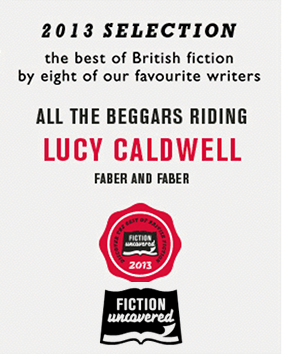 All The Beggars Riding is among the 8 titles on the Fiction Uncovered shortlist. Fiction Uncovered is a promotion which celebrates our best British fiction writers. The titles were selected by a judging panel chaired by novelist Louise Doughty, with judges Sandeep Mahal, Programme Manager at the Reading Agency, Lynne Hatwell, aka influential blogger dovegreyreader, and writer Courttia Newland.
All The Beggars Riding is among the 8 titles on the Fiction Uncovered shortlist. Fiction Uncovered is a promotion which celebrates our best British fiction writers. The titles were selected by a judging panel chaired by novelist Louise Doughty, with judges Sandeep Mahal, Programme Manager at the Reading Agency, Lynne Hatwell, aka influential blogger dovegreyreader, and writer Courttia Newland.
The promotion is supported by Arts Council England and funded by the National Lottery. The titles will be part of a summer promotion supported by retailers Foyles, Kobo, Waterstones, iBookstore, Amazon and independent bookstores across the UK. Fiction Uncovered authors receive a artist-bound edition of their book. For more information, visit the website
Fiction Uncovered Review
Lucy Caldwell’s All The Beggars Riding is difficult to write about without spoiling its effects. Not that the twists and revelations in it are particularly dramatic – in fact almost the opposite – but that they are so deeply woven into the fabric of the story that to tell to any great extent what the book is about, and how it goes about being what it is, would be to diminish it, and in the end make it rather less worth reading than it is.
In other words, it’s one of those books you have to take on trust – though if I mention that it’s been shortlisted for the Kerry Group Irish Novel of the Year Award 2013 and chosen as Belfast’s One City One Book mass read this year (this month, in fact), then at least you’ll know it’s not just me you’re trusting.
The book’s narrator is Lara Moorhouse, a young woman living in London under the shadows of a string of losses: being dumped by her long-term boyfriend, the death of her mother, and, further back, the death of her father, in a helicopter crash in Northern Ireland, where he worked as a plastic surgeon, patching up people who’d been blown half to pieces in the Troubles, only making it back in snatches to see his patiently waiting family. His job, of course, is deeply ironical, for all the time he is saving lives and faces, he is sinking the knife deeper and deeper into the life of his family, so slowly that you might not notice how much damage is being done.
What we get, then, is a portrait of a family seen with the bitter clarity of hindsight. “All the time I watched them as a child,” Lara writes, “and was convinced that no parents on earth loved each other as much as my mother and father – it wasn’t love, it was desperation, and addiction, and a shared guilt, and a need for that guilt and its consequences to feel justified.”
And that Lara writes what we read is equally important – for that’s another thing Caldwell gets just right. Lara’s self-discovery comes about through writing, through ‘Creative Writing’, and Caldwell very accurately mirrors the particular way that memoir and fiction mix and blur in contemporary literature, and the way that the Creative Writing industry is sanctioning, even formalising, a particular way for people to think about and use their own past.
Which might make the book sound tricksier or more severe than it is. All The Beggars Riding offers the reader a subtly intelligent and moving journey through domestic tragedy and its long aftereffects. If Lara Moorhouse had really written it, or if it really were Caldwell’s own story, disguised, we might applaud them their courage, and their accomplishment. But she didn’t, it isn’t, and so we must applaud Caldwell for something altogether slyer and more intriguing – a fake fake memoir that lives up to the demands of its genre, while also gently lifting the cover to show the machinery at work beneath. I could say more, but I’d ruin it.